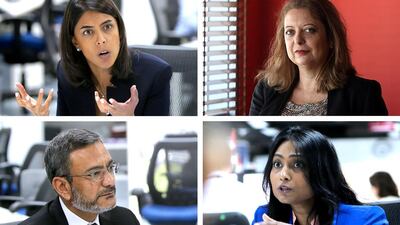I took out a loan to build a house and during the build my father had a heart attack and had to undergo bypass surgery. He then needed continuous care until he died. I was the one to bear the cost of the hospitals and all the medicine; I had no option but to fund it. Now I am working as a finance officer for a new clinic in Dubai earning Dh12,000 a month. But I owe almost Dh160,000 on three loans and two credit cards with five different banks. My debts are:
Loan 1: Dh46,658 (monthly repayment of Dh4,262)
Loan 2 (converted from a credit card): Dh63,876 (monthly repayment of Dh2,460)
Loan 3 (converted from a credit card): Dh20,853 (monthly repayment of Dh1,000)
Credit card 1: Outstanding balance of Dh14,000 (minimum payment of Dh1,200)
Credit card 2: Outstanding balance of Dh12,000 (minimum payment of Dh1,000)
I now need to reorganise my debts or amalgamate them into one loan. I tried to get a top up from my main lender but my company is new, so it is not listed. To help my situation, I am thinking of moving to a recognised company – though it will mean a lower salary – so that I can get a loan and settle all of this. My salary is no longer enough to pay the debts. What solution do you suggest?
SK, Dubai
Debt panellist 1: Rasheda Khatun Khan, a wealth and wellness planner
Medical emergencies can certainly set us back financially if we don’t have the right, or enough, insurance in place. First lesson to us all, review your insurance policies, medical, life and critical illness cover. Make sure you are covered as medical emergencies happen to all of us. See how much life cover you have and make sure it’s at the right level for your family. The effect on your finances, as you can see, is huge and not only for you but your entire family.
On another note, well done SK for knowing your numbers. This is a good start. The first thing is to find a way to manage the minimum monthly commitment. My suggestion is to see if you can restructure the terms for loans 1, 2 and 3. Make them over the longest term possible just so you can reduce the monthly repayment. If you can do that, then focus your efforts on credit card 2 by overpaying as much as you can until cleared. Meanwhile, keep making the minimum payments on the others. Once it’s cleared, concentrate your efforts on credit card 1. Overpay as much as you can until cleared, again keeping up the minimum payments on the others. Then you should tackle loan 3. Find a way to overpay until cleared. This is called the snowball effect. Physiologically we are motivated as one loan/credit card is cleared at a time and build momentum. We are then able to overpay more on the next one. At the same time, you must make provisions to build an emergency cash fund, as there will always be unforeseen expenses that come up. This will ensure you do not continue the cycle of debt.
Debt panellist 2: Ambareen Musa, the founder and chief executive of Souqalmal.com
Instead of trying to apply for a top-up loan, why don’t you speak to your primary bank about the possibility of consolidating all your debts? Debt consolidation would be the ideal solution in your case, since you have already accumulated significant high-interest credit card debt. However, this too could prove difficult to qualify for, since you’re working for a company that’s not on the bank’s approved list. But keep this option open, and check with other banks in case you meet the eligibility criteria elsewhere.
Switching jobs and working for a listed company will definitely increase your chances of qualifying for a debt consolidation loan. But in the meantime, you can ease up the financial burden by approaching individual banks for debt restructuring. This will involve restructuring the terms of your loans, by way of stretching out the loan tenure and making repayments more affordable. Debt restructuring is offered based on the sole discretion of the bank, so make sure you maintain a good repayment track record to help make a strong case for yourself.
With the two credit cards that you own, you must first focus on repaying the combined Dh26,000 you owe on them. This is most likely the most expensive debt you owe, and even though making minimum payments every month will give you temporary relief, you will accumulate higher interest charges in the future. By cutting back on all unnecessary spending and maybe asking your close friends or relatives for an interest-free loan, you can at the least, get rid of this credit card debt.
The Debt Panel brings together four financial experts: Jamal Alvi, the chief credit officer at Abu Dhabi Islamic Bank; Ambareen Musa, the founder and chief executive of the comparison website Souqalmal.com; Rasheda Khatun Khan, a wealth and wellness planner and founder of Design Your Life; and Keren Bobker, The National’s On Your Side columnist and an independent financial adviser with Holborn Assets in Dubai. Together they answer queries in a weekly online column to help readers better tackle their debts. If you have a question for the panel, write to pf@thenational.ae.
Follow The National's Business section on Twitter

